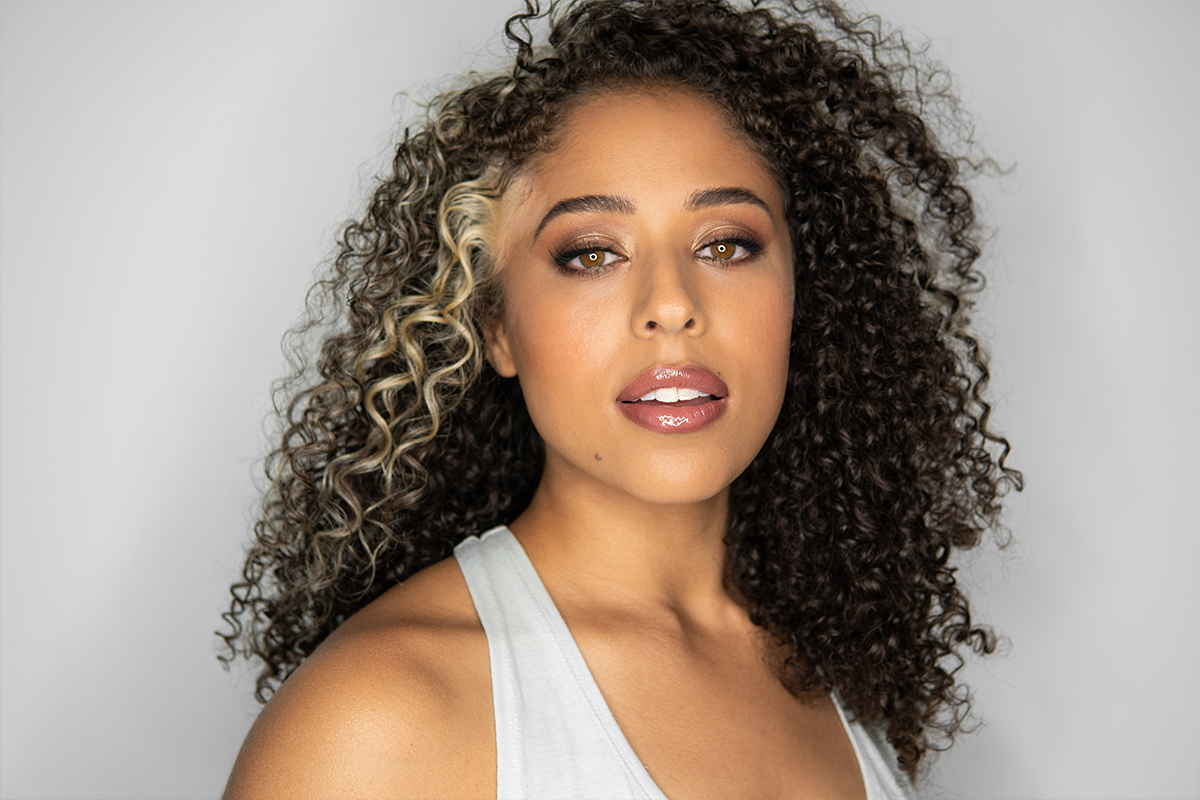I first saw Tatiana Wechsler in The New York Times Critics Pick and Drama Desk-nominated The Golden Bride. A Yiddish opera from the 1920s, the piece was revived and produced by the National Yiddish Theatre Folksbiene (NYTF) about a century later. Tatiana’s voice left a serious impression.
Picture a crowded marketplace in a small village in 1923 Russia. A peddler, Tatiana, walks out into the center of the plaza and belts out the woes of selling hot cakes, heyse babkelekh, to rich passersby who couldn’t give a rat’s tuchus. The song itself was soulful and heart wrenching, in large part because of its singer.
Tatiana was born in Washington Heights and raised in Atlanta, Georgia. The youngest of five, she grew up in a home with a variety of rich cultures — Dad was from the Bronx and mom, the Congo. When her parents first met in New York, her mother fell in love not only with him, but with his Judaism, too. Their family grew to become founding members of Or Chadash, a Conservative synagogue in Georgia, and it was there that a young Tatiana went to Hebrew school twice a week until her bat mitzvah. She later taught classes there herself as a way of giving back.
Shabbat was central in her home, she tells me on the phone, but so was music. Tatiana absorbed a variety of sounds: African Congolese music, French classical, jazz, Broadway showtunes, Rodgers and Hammerstein, Danny Kaye, Alan Sherman, motown, R&B, and hip-hop. Her family’s seders always had Tatiana’s non-Jewish friends in attendance. They featured homemade musical theater parodies, like the story of Moses starring Elmo and a sketch about Shifra and Pua, the women in Exodus who hid baby boys in Egypt from certain death. Her dad would play Methuselah, and Tatiana, wearing her mother’s African head wrap, would interview him as a reporter, asking, “Who is this Moses who has taken over Mesopotamia?” Fun, no?
It was no surprise, then, that Tatiana was drawn to the arts. Her parents wisely nurtured that love of languages, music, theater, and film throughout her childhood. She attended theater camp, participated in all the high school plays, and even put on shows for birthday parties. Tatiana’s first professional production was Joseph and the Amazing Technicolor Dreamcoat at the legendary Fox Theatre in Atlanta, a gorgeous 4,500 seater. She still remembers the high of holding the attention of an entire audience as a small child. “Yup, this is what I want to do for the rest of my life.”
A passion for storytelling led her to NYU’s musical theater program. It was upon graduating that she discovered the roots of the city’s show business: Yiddish theater. “It was a random audition,” Tatiana recalls. At the time she wasn’t in a union or represented, but Tatiana got the callback, and was later cast. “Maybe eight years of learning German as a kid came in handy.”
While Yiddish theater may have been Tatiana’s first entry into the Jewish arts, she notes that during the pandemic, she’s been performing more Jewish material than ever before. Take, for example, her solo concert from Fall 2020, where she weaves together a soulful and joyous tapestry of jazz and Jewish material in both Yiddish and English.
“I love doing it,” she said. “It’s so ingrained in me.” She looks back on a Shabbat scene in The Golden Bride. “And I’m like, I know all these prayers. I know what this is about… How special it is to be able to portray that work specifically as a Jew of Color. As a Black woman, I might not be the first type of person people think of.”
Over the past few years, Tatiana has engaged more with Black Jews specifically, and has learned plenty along the way. She’s very grateful that her childhood rabbis were from Latin America and for the exposure she received to a plethora of cultures. Not everyone experiences that harmonic blend. At the same time, she knows the sense of isolation and loneliness a Black Jew feels growing up. She could count the Jews of Color in synagogue on one hand. Today she bemoans the pervading “isms” that constrict our society. “Structural inequities inhibit people from inhabiting their full humanity.”
She was able to address those issues head-on this past winter as the director and editor of this year’s “Soul to Soul,” a theatrical concert of NYTF that celebrates the musical legacies and cultural ties between the Black and Jewish communities. “Soul to Soul” features a mix of spirituals, jazz, klezmer, and folk music. Tatiana directed and performed in this year’s edition, which was presented on Martin Luther King Jr.’s birthday.
This past year, Tatiana has adapted as an artist, becoming a video producer and editor. She’s now produced many concerts and music videos with only an iPhone. When you’re stuck in your apartment, your production options for set and costume aren’t as vast, to say the least, and you’re limited to the lights you have in your apartment — not to mention a static camera. But within those limitations, she’s discovered a new way to perform and focus on the story by highlighting her voice and creating mesmerizing harmonies. Clearly quarantine has not stopped her creativity, her drive, or her activism.
Passover is personal for Tatiana. She remembers her dad posting stickies with question marks all around the Passover table and living room. On the night of the seder, he was sure to call out, “At any point, if you have questions about anything, just ask.” She loves that memory, and not merely because she was the star singer of the Four Questions. Looking back, she appreciates Judaism’s invitation to embrace and live within the questions. As a kid, she craved kosher for Passover birthday cakes, and as a young adult, even while performing Shakespeare in regional theater, desired that special experience of a seder and sought out any synagogue hosting one.
Last year in quarantine, she held a Zoom seder with a friend and longingly talked about the skits and song parodies from home. “Do it with me,” her friend prodded. And so they did, bringing personal traditions to life even through a computer.
This year, Tatiana will be part of the Marlene Meyerson JCC Manhattan’s “The Third Seder: A Yiddish Passover Celebration,” a 90-minute virtual concert starring international Yiddish and klezmer artists, including Socalled and Frank London.
The concept of a “third seder” was a longstanding Yiddish cultural tradition featuring Yiddish Passover songs and poetry. Tatiana’s performance in the ensemble is sure to uplift the entire event, but her incredible rendition of “Go Down Moses” captures both her love of Passover and her spirit for social justice. The hot babkas she sold in The Golden Bride may not be displayed in this Passover special (hametz and all), but her awe-inspiring talent and empathic soul absolutely will.
The Third Seder, a free concert featuring Tatiana and many other Yiddish musicians, will take place this Sunday, March 21, from 2pm-3:30pm ET. You can register here.



